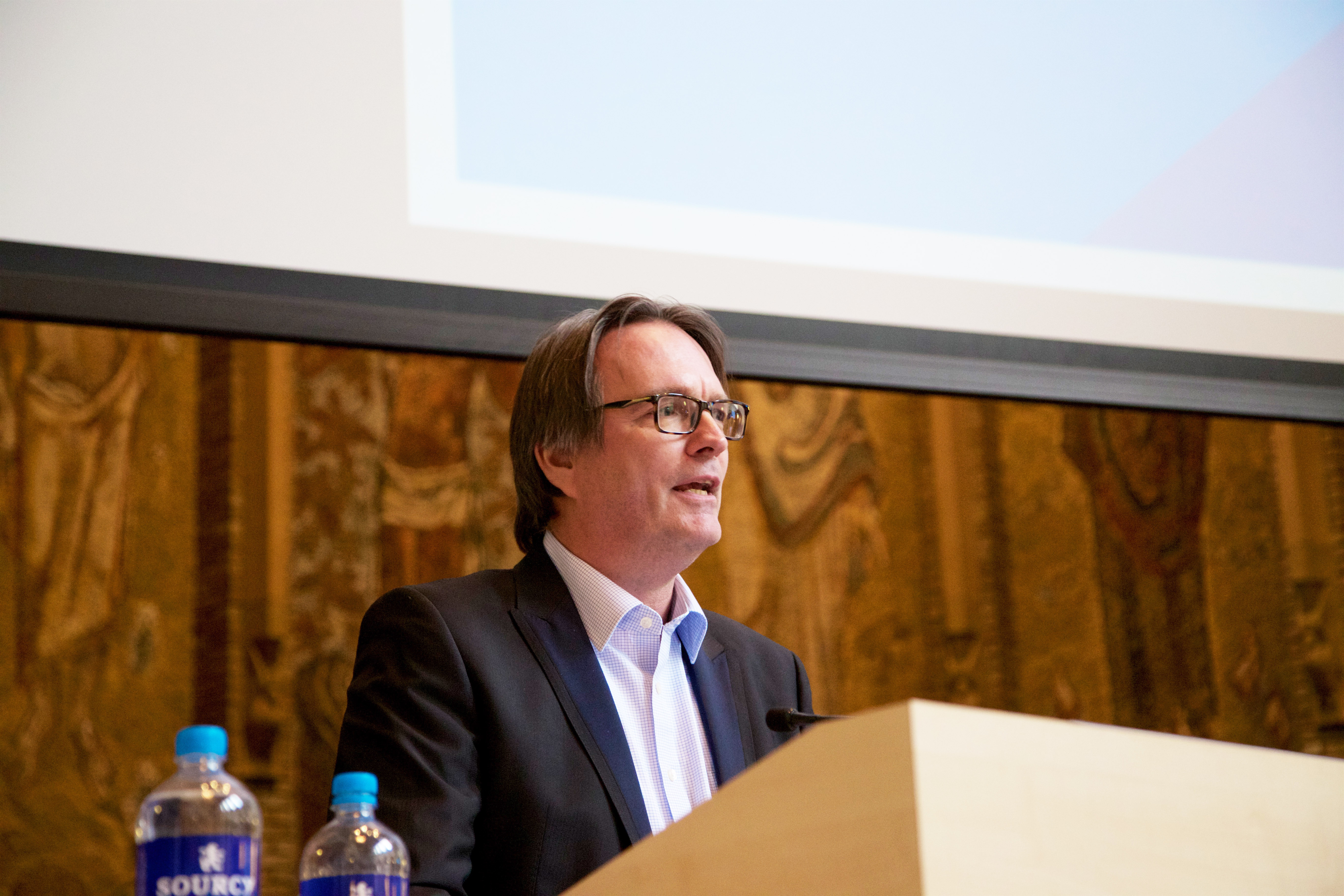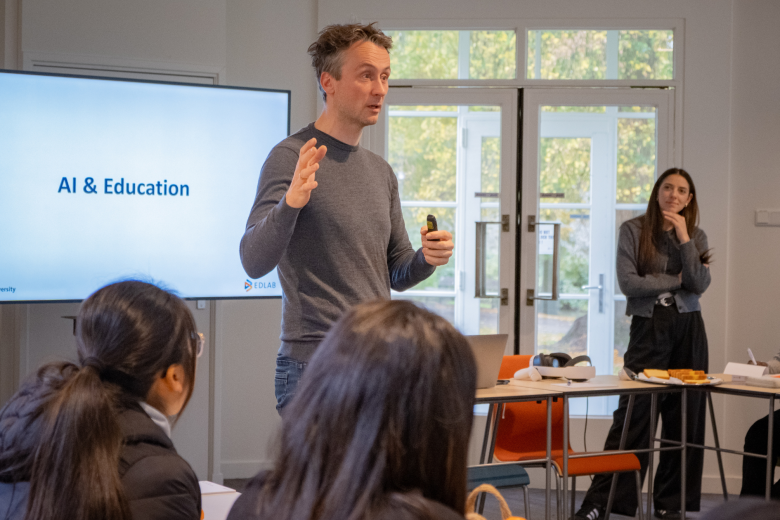The possibilities and future of online education
Online education has been on the rise in recent years, but the corona crisis has accelerated this development. Early this year, when there was no intelligent lockdown yet, UMIO|Maastricht University expanded its education portfolio with an online MBA study, called EuroMBA Online Track. As captain of MaastrichtMBA, Dr. Boris Blumberg was closely involved in the realisation of this study. We spoke with him about the possibilities and future of online education.

On 1 January 2020, UMIO|Maastricht University launched the EuroMBA Online Track, which is part of the MaastrichtMBA programme, just like the regular MBA study. With this new online study, the MBA landscape in Maastricht also has a flexible option. Because flexibility is the biggest advantage of online education, Boris Blumberg acknowledges. 'We saw that immediately after the government decided that all educational institutions had to close their doors', the MBA captain begins. 'Here in Maastricht, we managed to move our educational model to an online environment in no time, so that all students could participate in lectures and tutorial groups from home. In studies that focus on online education, such as the EuroMBA Online Track, students can also determine when they study and at what pace they do so. This can be an interesting option for professionals with a busy job, but also for people who live in remote areas. We may not be bothered by that in the Netherlands, Germany and Belgium, but I know that, for example, Stellenbosch University in South Africa has many students who have to deal with it.'
Relocation of infrastructure
Do educational institutions themselves also benefit from offering online education? Is it, for example, cheaper than offering regular education? Blumberg thinks that nothing sensible can be said about that at this stage. 'Replacing regular education with online education is actually a shift in infrastructure and therefore costs', he says. 'After all, you replace classrooms with server rooms, online platforms and other online facilities. And make no mistake, in education teachers are the largest cost factor and that factor does not change with online education.'
EuroMBA Online Track
Lower costs are therefore certainly not the reason why UMIO|Maastricht University started the EuroMBA Online Track. Blumberg: 'Compared to the US and the UK, we are lagging behind in online university studies in the Netherlands, Germany and Belgium. So it was high time to start doing this. We are helped by the megatrend of digitalisation, because the opportunities to provide high quality online education have grown tremendously. The quality of video and audio is much better than a few years ago, as is the quality of online education platforms.'
The different nationalities of the students are a major strength of the EuroMBA Online Track. 'The students all have different backgrounds and different world views. By discussing and exchanging ideas, they enrich each other’s thinking. That is very valuable. The personal approach is also a strength of our programme. There are three residential weeks in which the students come together at various universities in Europe. And within the online modules we work with small groups. We will never allow mass groups of students, because then we cannot guarantee personal attention.
Last but not least, the education of the EuroMBA Online Track is of high quality. We work with top teachers and have maximum international recognition with our Triple Crown accreditation from the AACSB, EQUIS and AMBA institutions. Our track recently finished as the highest-ranked online MBA study in the Netherlands in CEO Magazine’s Global Online MBA Ranking. Globally, we finished in 13th place. That says a lot about the quality we offer.'
Although the corona crisis also has consequences for the EuroMBA Online Track, these are limited compared to the regular MBA study in Maastricht. 'The online lectures will continue as usual, but we had to move the May residential week. This would take place in Barcelona', says Blumberg. 'In addition, we do not know yet whether we can continue the residential weeks of September in Aix-en-Provence and Rome.'
High quality education
A point of criticism towards online education is that there is little or no proper and regular interaction between students and between teachers and students. As a result, students may not be able to learn at the same level as students in regular education. What does the MBA captain think about this criticism? 'I understand it, but online education is not just a move from the classroom to an online platform. The way you teach also changes. You cannot simply cast your regular 1.5-hour lectures in the format of a webinar. After half an hour of screen time people drop out. It must therefore be shorter, without this being at the expense of depth and differentiated thinking. You have to be creative with that. In addition, you have no influence on what the students actually do behind their laptop. On the other hand, current techniques allow us to monitor much better to what extent students have really learned. We can find out exactly how long they have been active within our platform and what they have contributed.
As I mentioned earlier, we keep the level of education high by giving students a lot of personal attention. In addition, we ensure that the assignments for students are of master’s level. This means that we do not work with multiple-choice answers and that we assess the result - be it a paper, presentation or video - with substantive feedback. So not only a grade, but also an explanation. The students learn from that.'
Future of (online) education
Many people predict revolutionary changes in higher education following the corona crisis. Blumberg does not agree with that. 'The coronavirus requires that we physically distance ourselves from one another and online technologies allow us to do that. But I do not think this situation will become "the new normal", because we have too much need for physical contact moments.
In that context, I like to compare higher education with the music industry. After all, there are many similarities between the work of a teacher and that of a musician: there is a creative part that is expressed in the learning of new knowledge or the composition of new music, and there is a transferring part that is expressed in lectures or concerts. Despite the technological progress in the music world, people still like to go to large-scale concerts and small-scale unplugged sessions. Simply because the contact between the musicians and the audience creates added value on both sides. MaastrichtMBA, UMIO and Maastricht University are experts in unplugged sessions in the field of education. And I do not think we will replace these sessions with online sessions in the future, but we will look at how we can use the various online options to further enrich the unplugged sessions.'
'I also notice it in myself', Blumberg continues. 'I see my team through Zoom several times a week, but I look forward to physically meeting them again. Furthermore, I notice that because of this situation I share much more with strangers than before and I feel more connected to them, because we are all in the same boat. I hope to keep it that way after this crisis.'
Also read
-
Shaping the future of marketing: SBE scholars at the forefront of research and teaching
Three faculty members from SBE’s Department of Marketing & Supply Chain Management, Prof. Dr. Dominik Mahr, Dr. Jonas Heller, and Dr. Tim Hilken, combine cutting-edge research with innovative teaching and mentorship. From exploring the societal implications of digitalisation in courses such as...

-
UWC Maastricht students get a taste of education innovation at EDLAB
On 21 October 2025, EDLAB hosted students from United World College Maastricht for the second year in a row, as part of their Youth Social Entrepreneurship programme.

-
Maastricht University ranked #3 worldwide and #1 in Europe in 2025 Better World MBA Ranking
We are incredibly proud to share that the MBA programmes of Maastricht University School of Business and Economics’ executive branches, MSM and UMIO, have once again been recognised among the very best sustainable business MBA programmes worldwide. In the 2025 Better World MBA Ranking by Corporate...
